
Dormaa West: Home of cocoa, rice
The Dormaa West Constituency in the Bono Region has an economy dominated by agriculture and related activities, with the sector accounting for more than 80 per cent of the active labour force.
Advertisement
The constituency, known for its agriculture base, is the highest producer of cocoa, rice, poultry and other livestock farming in the region.
The area is also one of the major cocoa-producing areas in the country.
Located in the western part of the region, Dormaa West is in the forest ecological zone, making the area conducive to agricultural activities.
Profile
Dormaa West District, which occupies the same boundaries as the Dormaa West Constituency, was carved out of the then-larger Dormaa District in 2012, with its administrative capital as Nkrankwanta.

Francis Kwadwo Oppong, Dormaa West District Chief Executive
The constituency, with a total land area of 369 square kilometres, shares boundaries with Dormaa Ahenkro to the north, Goaso to the east, La Cote d’Ivoire to the west, and Sefwi Essam in the Western North Region to the south-west.
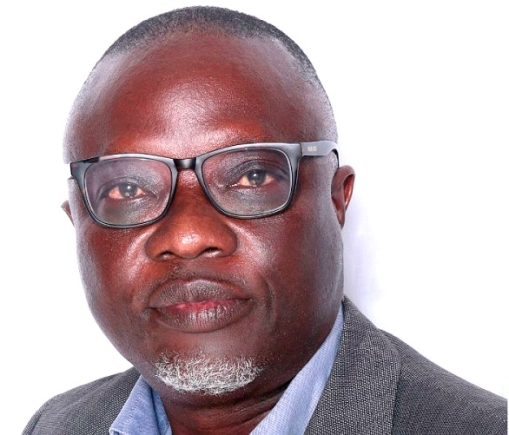
Vincent Oppong Asamoah, Member of Parliament for the Dormaa West Constituency
The area's population, according to the 2021 population and housing census, stands at 47,913, comprising 25,522 males and 22,391 females.
Demographics
Generally, the constituency has a mix of formal and informal workers such as farmers, security personnel, civil and public servants, teachers, health workers, traders and timber operators, among others.
It has communities with interesting names such as Ghana Abrewa, Jerusalem, Manhyia-Amponsahkrom, Krakyekrom, Sunkwa, Krakrom, Yaekrom, Nyame Ama-Brofoyedru, KY and Kyekyewere.
Others are Ntensere, Mantukwa, Amponsahkrom, Diabaakurom, Amoakrom, Yawusukrom, Kwabenakrakrom and Kwame Yeboahkrom, among others.
Political dynamics
Per the 2020 presidential and parliamentary elections, the constituency has 24,493 registered voters.
The area is a swing constituency, but the opposition National Democratic Congress (NDC) has dominated the politics of the area since its creation in 2012, winning two elections out of three polls there.

The front view of Nkrankwanta ICT lab
In the 2012 general elections, NDC's candidate, Vincent Oppong Asamoah, won the seat, polling 56 per cent of the total votes cast, while his sole contender, Ali Maiga Halidu of the New Patriotic Party (NPP), had 44 per cent.
In 2016, the outcome of the polls changed as Mr Halidu polled 51 per cent of the votes cast to beat Mr Asamoah of the NDC, who had 49 per cent.
The result turned in favour of Mr Asamoah of the NDC again in the 2020 general elections, where he polled 11,480 votes, representing 53.8 per cent, while Mr Halidu of the NPP had 9,874 votes, representing 46.2 per cent.
Rice production, 1D1F
The area has a tropical climate with distinct wet and dry seasons.
The dry season usually lasts from November to February, while the rainy season spans from May to September.
Farmers in the area produce plantain, cassava, maize, yam and other food crops, but rice is produced in commercial quantities.
Advertisement
Last year alone, the area produced about 4,000 metric tonnes of rice on 1,500 acres of land.
It is, therefore, not surprising that the constituency was selected from the region to host the GH¢7.243 million rice processing common user factory, a One-district, One-factory initiative at Nkrankwanta.
The area is among the only five constituencies in the country selected to benefit from the project, which is jointly funded by the Government of Ghana, the International Fund for Agricultural Development and the African Development Bank (AFDB), under the Rural Enterprises Programme (REP) project.
The facility has the capacity to process raw rice between 1.5 tonnes and 2.8 tonnes per hour.
Advertisement
Apart from food crops, the area is also noted for the production of groundnut, tomatoes, citrus and oil palm, with women in particular attracted to the oil palm production value chain.
Roads
Most of the roads in the constituency, including the Nkrankwanta town road, are untarred.
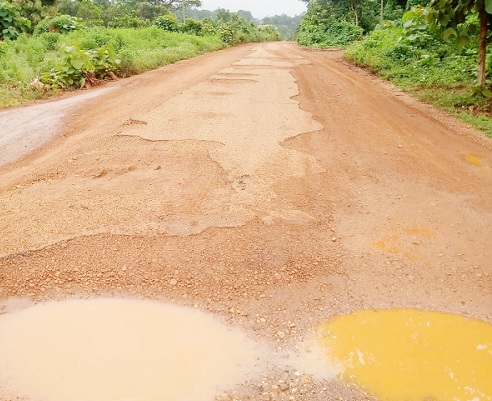
The current state of the Nkwanta-Kookumikrom road
Some economic roads such as the Nkrankwanta-Techimanfoakorase, Nkrankwanta-Krakrom, and Nkwantaso-Krokumi roads have pothole-riddled surfaces, making movement and transportation of foodstuff to the market centres very difficult.
Advertisement
The Kwakuananyah-Nkwantaso road and others, for instance, have been awarded on contract, but the contractors had left the site when the Daily Graphic visited the community.
Development
As a relatively new constituency, Dormaa West has not received much development as expected by the chiefs and people in the area.
The major market centre in the area is the Nkrankwanta Market, which operates on Fridays.
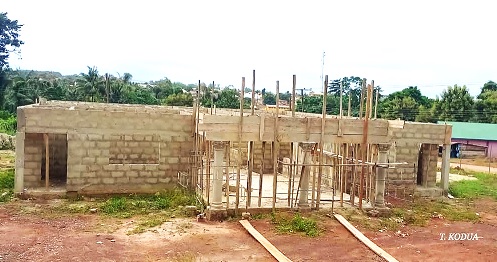
The ongoing Accident and Emergency Centre at the Dormaa West District Hospital
The market stretches over a five-acre land but is not being used to its full capacity due to the absence of basic facilities such as shops, water, warehouses and electricity in some portions.
Currently, some traders have provided temporal wooden structures to transact business while others have placed their goods, including foodstuffs, on the bare floor.
Notwithstanding, the area has benefited from some of the government’s flagship programmes such as the 1D1F programme and Planting for Food and Jobs.
Opinion leaders
The Assemblyman of the Asuopre East Electoral Area, Issifu Basomah, told the Daily Graphic that poor road network, including some town roads and lack of potable water, particularly in villages, were the constituency's major problems.
He explained that the Nkrankwanta Market was one of the biggest markets in the region but did not have the necessary facilities.
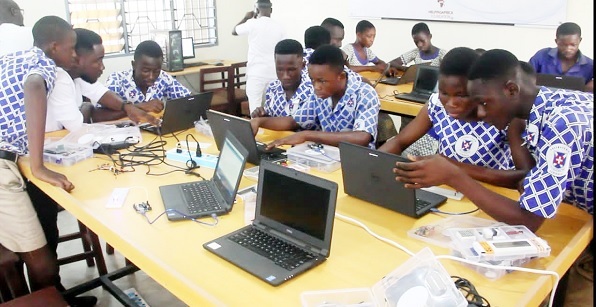
Some pupils and students studying in the ICT laboratory
Mr Basomah said the inauguration of the Rice Processing Factory at Nkrankwanta would entice farmers to increase their yields.
He explained that before the establishment of the facility, rice farmers had to transport their produce to Kumasi or Goaso for processing while others resorted to the traditional way of milling.
Investment
The Ankobea Akyeamehene of the Amasu Traditional Council, Nana Aguoni Gyabeaten, called on the government to invest in the improvement of roads in the area.
He explained that some contractors who were working on some roads, which was nearly completed, had abandoned them to deteriorate, as erosion had eaten parts of the roads.
He appealed to the government and financial institutions to support them with soft loans in order to invest in their farms, particularly in rice production, to improve yield.
MP’s intervention
The Member of Parliament (MP) of the area, Mr Asamoah said with the limited resources at his disposal, he had managed to execute several projects in the education, health and water and sanitation sectors.
He said he had also connected electricity to some deprived communities such as Nnobem, Boobookrom, Oppong Yawkrom, Akuraa and Yawnkwanta, Aniantetem, Apesika and Boabofour, among others.
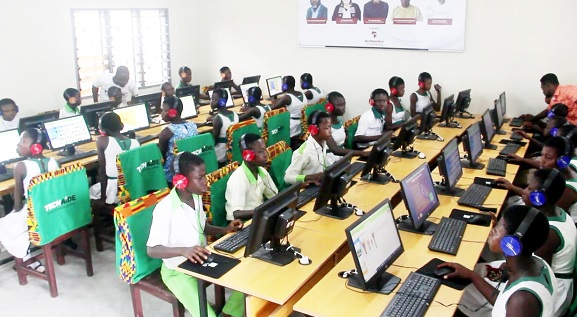
Some pupils and students studying in the ICT laboratory
On the water project, Mr Asamoah said he had constructed mechanised boreholes in communities such as Diabaakrom, Bredi, Akotokrom, Brofoyedu and Kyekyewere and repaired broken boreholes in other communities such as Kwabenakrakrom, Tekukrom, Nkwantaso, Beposo, Bredi and Akotokrom, among others.
He added that he had also supported more than 328 apprentices by paying fees to their masters at a cost of GH¢98,400, provided tools and equipment at a cost of GH¢164,000, supported the Nkrankwanta Motorking Association with GH¢5,000 to acquire land to erect a pavilion for their new station and paid 2021 dressmakers graduation fees which amounted to GH¢9,600.
On education, he said he had constructed an ultramodern computer lab at a cost of over GHS600,000, paid 40 students’ fees valued at GHS45,000, built a four-bedroom teachers’ bungalow at Adiemmera Zezera and donated laptops and printers to the District Education Office.
DCE speaks
The Dormaa West District Chief Executive (DCE), Francis Kwadwo Oppong, told the Daily Graphic that the assembly had worked hard to improve the infrastructure deficit in the area.
He said when he assumed office in 2021, he realised that there were several uncompleted projects, including the district assembly office complex and the 1D1F Rice processing factory scattered across the area.
Mr Oppong said while new projects were started, the assembly also invested in the completion of ongoing projects to reduce the infrastructure deficit.
He said he had completed some of them, which are currently in use, while others were at various stages of completion.
Mr Oppong said he had lobbied for projects from Non-Governmental Organisations such as Madamfo Ghana, to construct a six-unit classroom block for the Diabaa D/A Basic School.
He said the construction of the Accident and Emergency Centre at the Dormaa West District Hospital and a three-unit Kindergarten Block for the Yaakrom Presbyterian Basic School were ongoing.
Mr Oppong said the assembly had also renovated some dilapidated projects such as a classroom block at the Nkrankwanta Senior High School after it was ripped off during a rainstorm and distributed 750 dual desks to reduce furniture deficit in schools in the area.
He said the assembly had also distributed 8,000 oil palm seedlings and 7,000 coconut seedlings to farmers to boost commodity cultivation in the area.
"The development of every sector in the district is on course and we will continue to work hard to improve the lives of people in this area".
Writer's email: [email protected]




